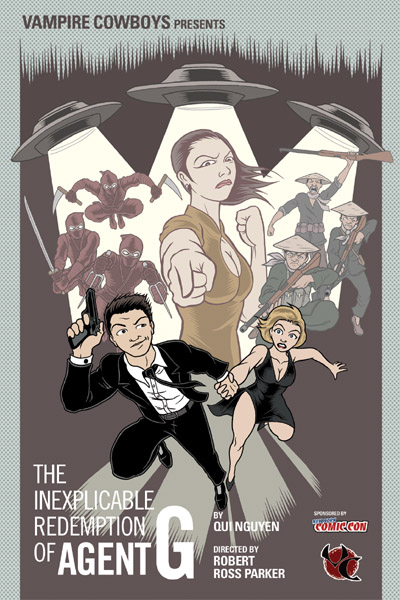Vampire Cowboy's
The Inexplicable Redemption of Agent G

There's no better way to answer the question "What Was This Show?" than to quote the character of the playwright in the play: "This is a Vampire Cowboy show, bitch." I may never have seen a Vampire Cowboys production before, but I think I have a pretty good idea of what that means now, and I think I'm in love.
MASTERS OF PARODY
The primary form of Vampire Cowboys is through faithful and hysterical parody. Not just one genre of parody -- parody of every possible relevant or irrelevant genre. The opening sequence is a Vietnam war scene pulled straight out of Rambo but within a few minutes we could be lurching into a perfect recreation of the snow sword fight from Kill Bill or a pretty inappropriate sequence of Sesame Street mixed with early-90s educational hip-hop.
This show, however, transcends parody as geek fun by becoming self aware. The ostensible plot of The Inexplicable Redemption of Agent G is the completion of the Gook Story Trilogy, a cycle of plays detailing how Qui Nguyen's cousin Hung (Paco Tolson) escaped from Vietnam on a refugee boat (during which his parents and brother die) and comes to resettle in Alabama with his new family.
But the real story is the the struggle between Qui and the play itself. Qui himself appears in the story, played by William Jackson Harper (not played by Qui himself, who sat in the audience the night I was there). As the play progresses, the characters within the play force Qui to confront the story, and to do his best to tell it right.
Meta? Definitely. But it's beyond simply meta -- it's what happens when parody swallows itself whole. Parody involves flattening a genre into its recognizable elements. In this play, Qui presents himself in flattened form -- as a parody -- in order to struggle back towards three dimensionality.
By parodying himself and Vampire Cowboys as a whole, he covers in an engaging way a subject which can be pretty tired: how hard it is for a minority playwright to tell a story in a simple and honest way while feeling the pressure of a thousand expectations.
THE PLAYWRIGHT'S DILEMMA
The expectations placed on Qui Nguyen enter the story are represented by the accusations of his baby's momma (Bonnie Sherman), the cast, and eventually the representation of David Henry Hwang (Jon Hoche), as well as former mentors and audience members.
Parody is the perfect form for exploring this dilemma -- not just because it provides the kind of light fun that makes the issue fun, but because it has something interesting to say about people's expectations on a writer. When Qui Nguyen tries to match the expectations, he becomes an imitation -- which is basically an unaware parody, a parody drained of power and fun.
The whole play, in fact, slowly reveals itself to be a parody of Yellow Face. But it's a parody of a parody of a parody -- turtles all the way down.
When all of the parody collapses and Qui Nguyen is left with the story, it's a rewarding culmination of neurosis, and a worthy resolution to Hung's story.
RACE ON STAGE
In a broader way, Qui Nguyen is full of tricks regarding representations of race onstage. I don't want to spoil any of it, but I'm going to say that it was handled in the most conscious and yet fun way I've seen yet in New York.
DON'T FORGET THE FUN
All of this intellectualism aside, the reason you'll be glued to your seat will be the sheer fun of it all. It's energetic, rolls forward, and gives you a fun time along the way.
Particularly, your life will be enriched by watching the slapstick and energetic character performances of Jon Hoche. I could probably simply watch him for the rest of my life. Once you get ten minutes into the play, any time his face appears onstage you're already primed to laugh.
If you want to have something that's deep, belly-laugh fun while still being emotionally grounded and food for thought, you can't come up with a much better combination than Agent G. This is a play for a single moment and a single community, so if you don't catch it now, you probably will never catch up to it again.
(Disclaimer: I was in attendance with an un-paid for ticket; not in exchange for this review, but on assignment forThe Orange Hats.)